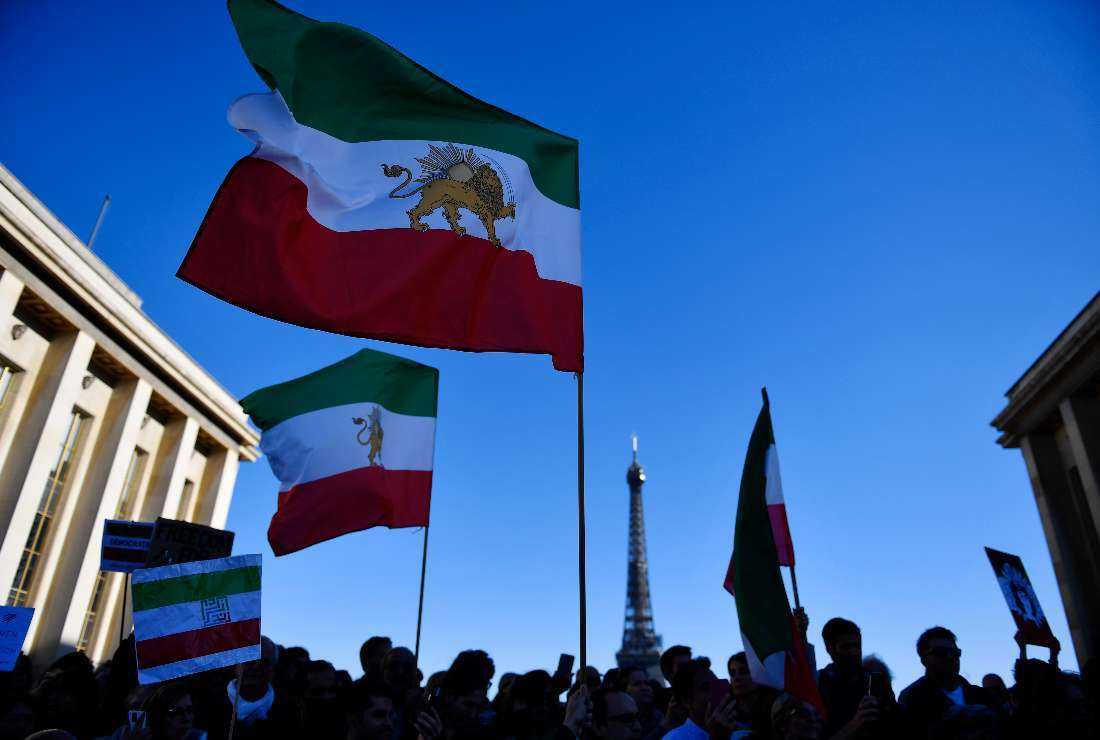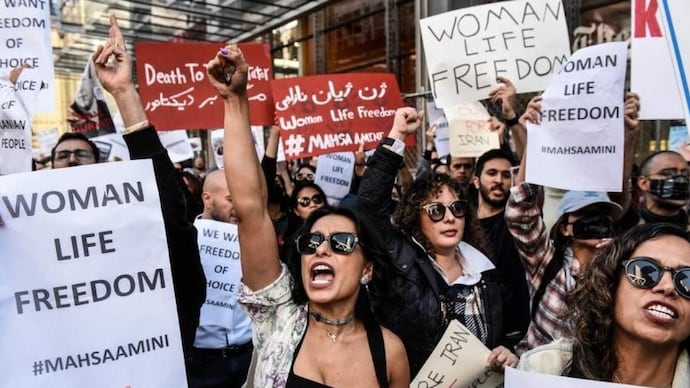
Lisa Hänel
12/09/2022
A militant group of Germany's far-right extremist Reichsbürger movement apparently planned to overthrow the government. Could such a coup succeed?
"According to our findings, the association has set itself the goal of eliminating the existing state order in Germany, the free democratic basic order, using violence and military means." This is how Attorney General Peter Frank described the reasons that led to a major raid this week against supporters of the so-called Reichsbürger movement.
Members of the Reichsbürger movement deny the existence of the post-WW2 Federal Republic of Germany. They believe the current state is no more than an administrative construct still occupied by the Western powers — the US, the UK and France. For them, the 1937 borders of the German Empire still exist.
But what does the group mean by "eliminate the free democratic basic order"? It can mean attacking politicians, storming parliamentary buildings, overthrowing the federal government, dissolving the judiciary, and usurping the military.
Is such a thing even within the realm of possibility in today's Germany, with its more than 75 years of democracy, a constitution, firm structures, and separation of powers?
"The state is defensible, the absolute majority of citizens not only identify as democrats but also find democracy worth protecting," Andreas Zick, head of the Institute for Interdisciplinary Research on Conflict and Violence at Bielefeld University, told DW.
Timo Reinfrank, executive director of the Amadeu Antonio Foundation, which aims to strengthen civil society against right-wing extremism, also confirmed: "A real coup d'etat can hardly succeed in Germany, the state order and the constitution are too solid for that."
Extremists with far-reaching connections
And yet: Political analysts this week have warned against underestimating the group that was arrested and the associated militant scene. The group is "insanely dangerous," warned Sebastian Fiedler, spokesman on criminal justice policy. for the ruling center-left Social Democrats (SPD). The Reichsbürger movement, as a whole, is capable and willing to carry out serious terrorist attacks against the state, says terrorism expert Peter R. Neumann.
The Reichsbürger movement in Germany
They join protests against measures to slow the spread of coronavirus, and reject the legitimacy of Germany's government. Some are prepared to use violence.

What do Reichsbürger believe?
"Reichsbürger" translates to "citizens of the Reich." The nebulous movement rejects the modern German state, and insists that the German Empire's 1937 or 1871 borders still exist and the modern country is an administrative construct still occupied by Allied powers. For Reichsbürger, the government, parliament, judiciary and security agencies are puppets installed and controlled by foreigners.

What do they do?
The Reichsbürger refuse to pay taxes or fines. They see their personal property, such as their houses, as independent entities outside the authority of the Federal Republic of Germany, and reject the German constitution and other legal texts, but also swamp German courts with lawsuits. They produce their own aspirational documents such as passports and driving licenses.
How much of a threat are they?
The Reichsbürger scene began to develop in the 1980s and is a disparate, leaderless movement that has grown to about 19,000 supporters, according to German intelligence officials. Of those, about 950 have been identified as far-right extremists and at least 1,000 have a license to own firearms. Many subscribe to anti-Semitic ideologies.
Who are its members? One was Mr. Germany
According to German authorities, the average Reichsbürger is 50 years old, male, and is socially and financially disadvantaged. The movement's members are concentrated in the southern and eastern parts of Germany. Adrian Ursache, a former winner of the Mister Germany beauty pageant, is also a Reichsbürger and was sentenced to seven years in prison in 2019 for shooting and injuring a policeman.
Turning point
The case of Wolfgang P., who in October 2017 was sentenced to life in prison for murdering a police officer, is seen as a turning point for how German authorities deal with the extremist group. P., an alleged Reichsbürger member, shot at officers who were raiding his home to confiscate weapons. The case gained international attention and set off alarm bells over the escalation of violence.
What are the authorities doing about it?
German authorities were accused of long underestimating the threat. In 2017 for the first time Germany’s domestic intelligence service documented extremist crimes perpetrated by individual Reichsbürger. Since then there have been several raids on Reichsbürger targets and subgroups have been banned. Police and military have also probed whether they have Reichsbürger in their own ranks.
International parallels, conspiracy theories
Reichsbürger have been seen waving Russian flags, leading to allegations that they are funded by Russia with the aim to destabilize the German government. Germany's Reichsbürger are also compared to US groups such as "freemen-on-the-land," who believe that they are bound only by laws they consent to and can therefore declare themselves independent of the government and the rule of law.
What specifically makes the particular group that has been rooted out so dangerous? One reason is its composition, another is the ideology that binds them. The 25 people arrested this week apparently belong to a hodgepodge of extremists — among them are Reichsbürger and opponents of strict anti-COVID-19 measures who took to the streets in the past two years.
What they have in common is their rejection of the democratic state, though not all of them are figures on the fringe of society or far-right extremist radicals.
"They are in parts educated groups, they are people who pursue a profession, who move from the center into the scene and can build a parallel society there," says sociopsychologist Zick. "Over several years they were able to develop a cohesive milieu and forge and alliances to other groups."
Danger to the rule of law
Among those who were arrested is a judge and former Bundestag MP for the far-right populist Alternative for Germany (AfD). The group also included former army officers, aristocrats, and former members of the police. People, in other words, who have contacts, insights into democratic institutions, and financial resources. Several of them own and are able to use firearms, many of which were seized during the raid.
That makes those arrested and their supporters a threat to the rule of law, even if they can hardly bring the system to its knees. "It may not be able to launch a successful coup, but bits of ideology can be spread and be embraced by other extremist groups or even by individuals in the mainstream of society," Zick said.

COVID protests brought extremists together
The sociologist warns that many people are united by what has become a dangerous ideological mix. Some of them believe there is a state within a state that operates in secret and they subscribe to antisemitic conspiracy theories. "Central to this is also that many of the groups virtually demand the system be overthrown, because they do not recognize the form of government and democracy at its core," Zick explained.
The COVID-19 pandemic and the associated protests in particular have contributed to a radicalization of the scene, many experts conclude. Some people have lost faith in the state and have become receptive to perceived struggles for freedom and to demands for the establishment of an alternative state.
"The coronavirus protests have brought together various groups from the middle-class center, right-wing populism, right-wing extremism, conspiracy-oriented and other milieus about ideologies of resistance and freedom," said Andreas Zick.
"It's certainly not classic right-wing extremists, but it's something I've been calling conspiracy extremism for some time now, in which case you could say more precisely right-wing conspiracy terrorism," explained the SPD's spokesman on criminal policy, Sebastian Fiedler.

And politics and society have apparently not yet found a way to combat this. Fiedler said, for example, that the state authorities and politicians now understand quite well how radicalization in right-wing extremism and Islamism works and have set up deradicalization programs accordingly. But they have not yet begun to take action to deal with conspiracy myths. Conflict researcher Andreas Zick also advocates analyzing the groups to then develop a prevention plan.
Establishing a prevention plan seems more urgent than ever: it is precisely crises in a complex world that can push people away from democracy, which can sometimes seem tedious and complicated, and toward the simple explanations that make conspiracy myths so attractive.
"Extremism, in particular, is changing, and especially in times of crisis," Zick warned. "We tend to focus on the majority of the people, but it's small groups like terror cells that can make a state unstable."
This article was originally written in German.























